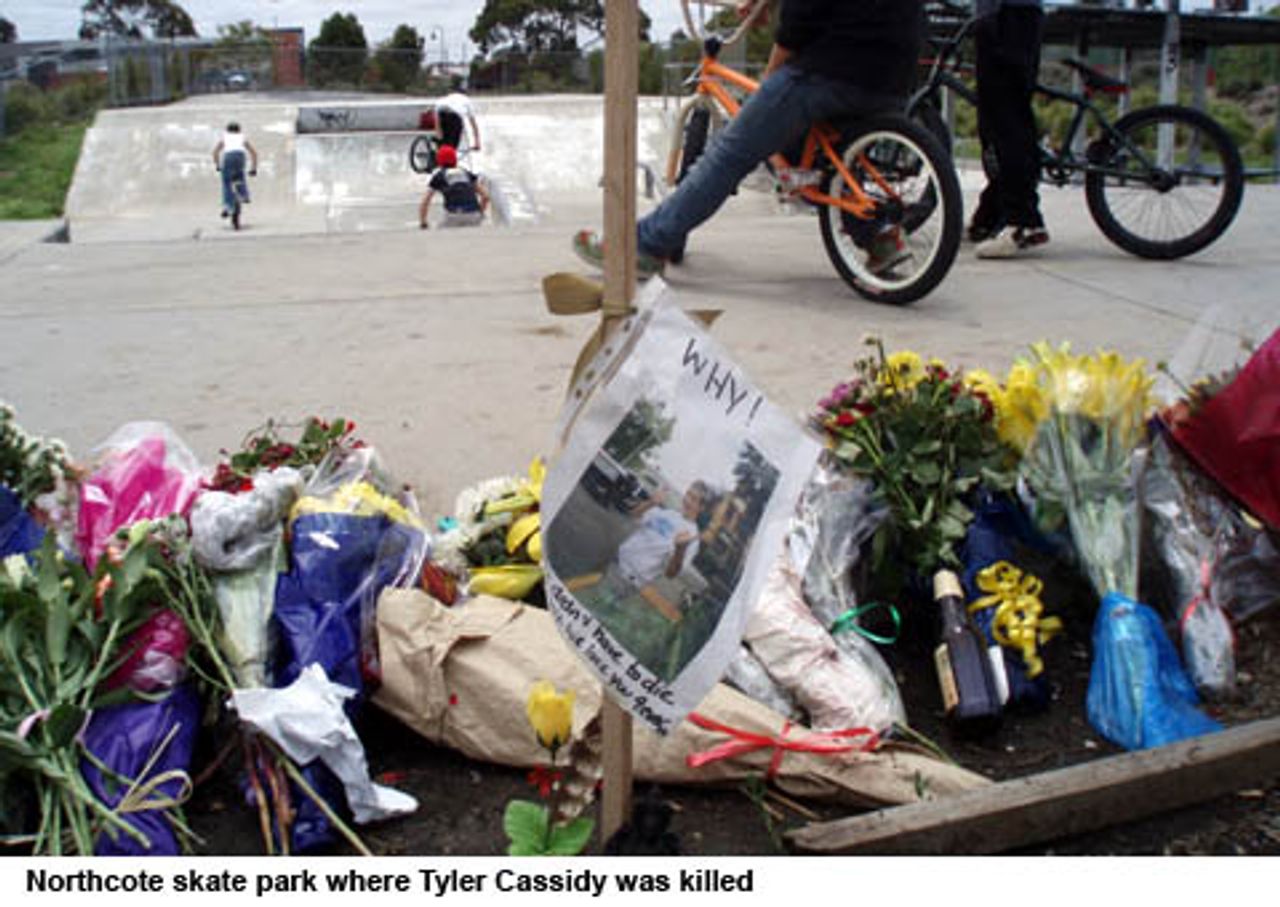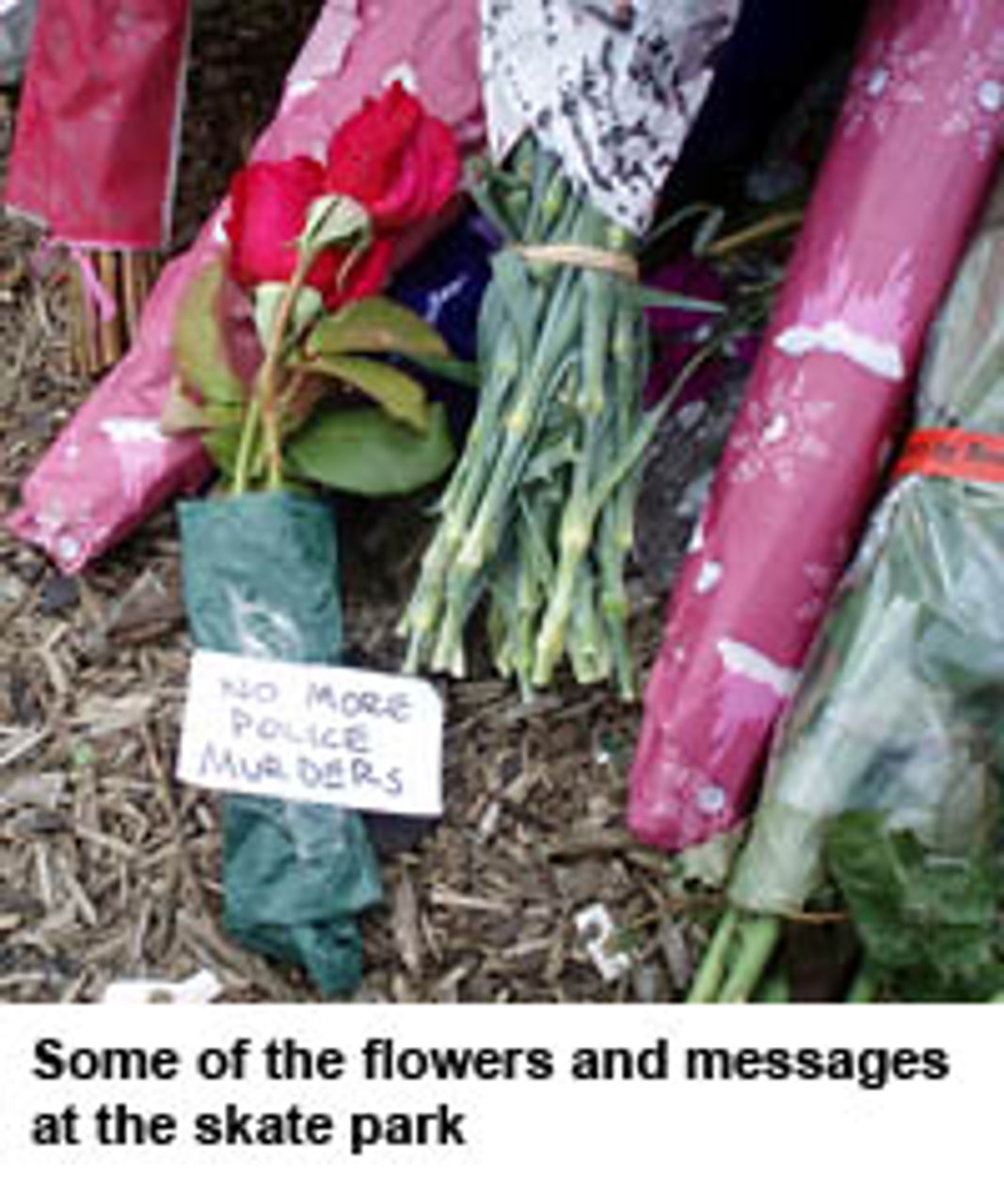Fifteen-year-old Tyler Cassidy was shot dead by police officers in Melbourne, Victoria last Thursday night in a callous and brutal act. Four officers surrounded the agitated youth at a skate park in the suburb of Northcote and killed him in a hail of at least six bullets. The shooting has sparked public outrage and recalled the filthy record of Victorian police, who have become notorious for opening fire on anyone perceived as a threat, including the young and mentally ill.
A full account of the events leading up to Tyler's death is yet to emerge. What is known so far is that on Thursday evening the youth reportedly arrived at his home in a disturbed state, after having possibly been assaulted on a train. He then walked to K-Mart, pulled two knives from their packaging and stabbed items on the shelves. By around 9.30 p.m., several people had called the police. Four officers quickly arrived on the scene; one reportedly used capsicum spray without effect. Tyler ran to an adjoining skate park where he was again doused with a shot of capsicum spray before being shot dead when three of the four officers opened fire.

Police authorities immediately defended the officers involved, claiming that they had acted correctly and had no choice but to shoot the youth. Greg Davies, a spokesman for the Police Association, insisted: "These members behaved in a completely professional and appropriate way and in accordance with their training." Davies noted that police guidelines state that whenever officers use their guns they must aim for the victim's chest—effectively a shoot-to-kill policy. He contemptuously brushed aside arguments that the priority should be to preserve life by aiming only to disarm or immobilise: "anyone who thinks that you can shoot a weapon out of someone's hand watches too many spaghetti westerns, that's just the way it is."
There has been no satisfactory explanation as to why it was not possible for four trained adult police officers to subdue the young boy without opening fire. One officer, apparently violating protocol, fired a warning shot into the ground moments before Tyler was killed—contradicting the police line that it was impossible to attempt to immobilise the boy by shooting at his arms or legs. And according to a report in Tuesday's Herald Sun, one of the three officers who opened fire had indeed aimed for Tyler's legs; he had several bullet wounds in his legs and chest.
There are many outstanding questions. Why did it take five days after the event for it to emerge that one of the officers had initially attempted to subdue Tyler by shooting him in the legs rather than the chest? Only three of the four officers involved fired on Tyler. Is this because, as the police now claim, another officer was standing in the way, blocking the line of fire? Or was it because this officer judged that resorting to gunfire was unnecessary?
There is also substantial evidence indicating that the police should never have permitted the situation to develop to the point where they felt they had to open fire. Shani Cassidy, Tyler's mother, had initially called the police when her son left the house to go to K-Mart to warn them he was in an agitated state and to ask that she be contacted if he were found.
 The Cassidy family released a statement the day after the police killing. "The entire family and friends of Tyler Cassidy are appalled at the actions by the Victoria Police last night," it read. "Their heavy-handedness, and lack of negotiating skills at the scene of the shooting, contributed to the untimely death of our beautiful 15 year old. He was in the prime of his life, had just started a new school, and was coping really well. He was a popular student with high expectations and a good network of friends. The Northcote police were notified 30 minutes prior to the killing and briefed completely on what had happened including what he was wearing and to look out for Tyler.
The Cassidy family released a statement the day after the police killing. "The entire family and friends of Tyler Cassidy are appalled at the actions by the Victoria Police last night," it read. "Their heavy-handedness, and lack of negotiating skills at the scene of the shooting, contributed to the untimely death of our beautiful 15 year old. He was in the prime of his life, had just started a new school, and was coping really well. He was a popular student with high expectations and a good network of friends. The Northcote police were notified 30 minutes prior to the killing and briefed completely on what had happened including what he was wearing and to look out for Tyler.
"The four officers concerned acted unacceptably by killing Tyler last night. He had a very gentle side, striving to grow from a boy into a young man and would have been completely overwhelmed by the situation. The police according to our witnesses chased him, cornered him at the skate park in Northcote, he was surrounded and gunned down by four officers firing at least six or seven shots. Our eyewitness confirmed that Tyler patted her dog, was confronted by the police and sprayed with capsicum foam, then pursued to the skate park, surrounded and hunted down. We look forward to a serious and thorough investigation and inquest into why Tyler was killed and to the serious nature of the attending officers' actions. It should have been dealt with differently and more compassionately, but tragically resulted in Tyler's death that should have been avoided."
Hariet Stewart, who was in the park at the time, and saw Tyler running towards the skate park, commented: "There appeared to be enough police cars coming and it doesn't justify how they would have found themselves in a situation where they had to shoot a child. I think it is outrageous. He was only a child."
The eyewitness referred to in the Cassidy family statement wrote a letter to the Age which was published on Tuesday: "My partner and I were faced with someone with a weapon on Thursday night. Tyler Cassidy passed us near the bottle shop in the car park. I did not, however, encounter someone ‘violent and irrational' or ‘angry'. I cannot comment on Tyler's behaviour before, when he was in the shopping centre, or after, when he was with the police, but I can remark on our encounter with him minutes before he was shot. He bent and patted our dog. We did not feel threatened. Nervous maybe. We saw an agitated boy who was crying out for some attention. We saw a kid who needed to talk to someone... In terms of our own safety, we regard ourselves as lucky that we came across Tyler near the bottle shop and were not coming from the park minutes later, when there was police gunfire. We feel sadness and confusion over what has happened and our hearts go out to his mother."
Public outcry
There has been enormous public sympathy for the youth and his family, expressed in letters to the editor, talkback radio, and internet forums. Tyler's friends and family describe a popular and friendly but troubled young person. His father died of cancer four years ago—a loss which, unsurprisingly, had an immense and enduring effect on the boy.
Tyler's killing follows a similar incident in Greece, where the death of a 15-year-old boy at the hands of the police has sparked ongoing street clashes, demonstrations, and anti-government strikes. There is no doubt that this response has contributed to the extremely nervous reaction, in political and media circles, to Tyler's tragic death. A central feature of the media coverage has been an outrageous attempt to limit public sympathy for the dead youth and his family by portraying him as a neo-fascist. A series of lurid stories has emerged detailing the activities of the "Southern Cross Soldiers"—a hitherto unknown racist and nationalist group of youth with whom Tyler reportedly had some contact.
Tyler's mother denied he was a member of the group. "Accusations that he was involved in a nationalistic group are far-fetched," she said. "He was 15-years-old. He attended a multi-cultural school. Many of Tyler's friends came to the house in tears. They are from all different nationalities and they are also grieving."
The other line being promoted by both the media and the police is that the incident may have been "suicide by cop". Tyler reportedly called the police himself when he was in K-Mart, and in one call pretended to be a witness reporting that there was a man with a shotgun who had to be killed. Police also claim Tyler said, "Kill me, I am going to kill you", during his brief confrontation with the four officers. Whatever the truth of these reports, the "suicide by cop" story is nothing but an attempt by police to absolve themselves of all responsibility. The "suicide by cop" alibi is typically invoked whenever the police shoot mentally disturbed or agitated people, or those on alcohol or drugs—as though the purported self-destructive comments of such people give the police carte blanche to kill them.
Victoria has a long history of fatal police shootings in which no officer is ever held to account. Since 1987 there have been 42 such killings, with 24 of these occurring in the seven years before 1995. A large proportion of the victims have had a history of mental illness. In 1994 alone, police shot dead nine people—six of whom were suffering from a mental illness. In the same year, state coroner Hal Hallenstein delivered his findings on seven earlier fatal police shootings. He determined that no police officer was criminally responsible, although they contributed to the outcome by positioning themselves in such a way that they had no alternative but to shoot the victim.
The rate of police shootings has again escalated this year, with Tyler's death marking the fourth shooting incident. Two men were killed earlier in the year, after allegedly attacking police.
In 1994, in response to mounting public indignation at the carnage, the state government commissioned a report that recommended cops be given capsicum spray, supposedly because it would provide an alternative to existing lethal weapons. The spray was introduced in 1996. Far from representing an alternative to firearms, however, it has become an additional weapon used widely by police as a form of punishment or to exact compliance even where there is no threat of violence.
In the aftermath of Tyler's killing the police are again demanding greater powers and weaponry—this time taser guns. Tasers electrocute the victim by delivering a 50,000-volt charge through metal barbs which hook into the skin of the victim. Data produced by Amnesty International has linked tasers to 152 deaths in the United States between 2001 and 2006. At present, only a special paramilitary unit within Victoria Police, the Special Operations Group, trained to act with extreme force, is armed with tasers. Equipping all police officers with the weapon would represent a significant escalation of their repressive powers and would almost certainly lead to more deaths.
